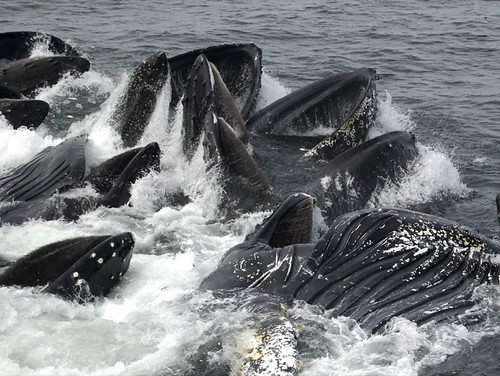 |
| A group of humpback whales feeding on small fish |
Humpback whales have been spotted feeding off the Jersey coast this month. Though we don't know a lot about their time off our coast, it is thought that humpbacks may only be using New Jersey waters as a migratory pathway between their summer feeding grounds in the north and their winter breeding grounds in the south. Feeding has been regularly documented in New Jersey waters and individuals have been observed close to the shoreline, including within Delaware Bay.
Recently, a paddle boarder off Stone Harbor spotted the whales from the beach and paddled
out for a closer look and shot some video.
out for a closer look and shot some video.
During the summer, humpback whales spend most of their time feeding and building-up fat in the cold waters of the North Atlantic. These fat stores are crucial since after their long migration to winter breeding and calving grounds, located in warmer subtropical or tropical waters, there will be no feeding for the entire winter.
Humpback whales have one of the longest migrations of any animal. They have been known to travel up to 5,160 miles between summer feeding grounds and winter breeding grounds. Humpbacks have been known to travel 3,000 miles in as few as 36 days.
In 1966, the International Whaling Commission prohibited commercial whaling of humpbacks due to the decline of the species. It was listed by the federal government as endangered in 1970 and, as a result of that federal status, was automatically added to the New Jersey endangered species list following enactment of the New Jersey Endangered and Nongame Species Conservation Act in 1973.
Humpbacks are provided with additional protection with the Marine Mammal Protection Act of 1972. Marine mammals should not be approached closer than 50 yards. Despite the ban on hunting, humpback whales face a number of human threats, including entanglement in fishing gear, collisions with ships, harassment by whale watchers and habitat impact.
http://www.conservewildlifenj.org/species/fieldguide/view/Megaptera%20novaeangliae/
No comments:
Post a Comment